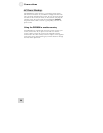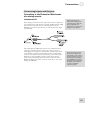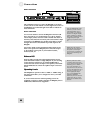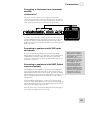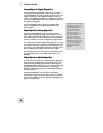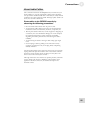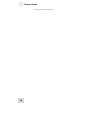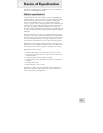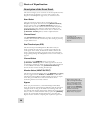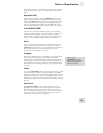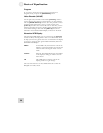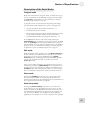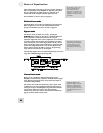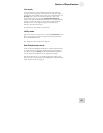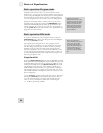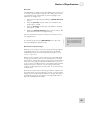
3 Basics of Equalization
Description of the Front Panel
This section will give you an overview of the front panel’s features.
Not all features are labeled, so you may want to refer to the
diagram of the DEQ830 on page 18 as you read this section.
Band Select
There are 31 buttons side-by-side on the left half of the
DEQ830’s front panel. The first 30 are the [BAND SELECT]
buttons. Above each of the [BAND SELECT] buttons is a
number like “25” or “8k.” These stand for the audio frequencies,
measured in Hertz (Hz), which are selected for editing by the
[BAND SELECT] buttons below them. The 31
st
button is the
[CHANNEL LEVEL] button, which is explained below.
Channel Level
For details on the
relationship between Master
L
evel and Channel Level, see
p
age 32.
The [CHANNEL LEVEL] button is used to set the level of the
currently selected channel or Link Group. This setting is post-EQ
and pre-Master Level.
Real Time Analyzer (RTA)
This button will put the DEQ830 into Real Time Analyzer
mode, in which the unit serves as a visual aid for analyzing the
audio signal. In this mode, the Band Gain LEDs “dance to the
music,” displaying the relative strengths of the various frequency
ranges passing through the DEQ830. For more on this mode, see
page 43.
Channel Select
To the right of the [POWER] button, you’ll see the
[CHANNEL SELECT] buttons. These eight buttons are used
for selecting a channel for which the EQ settings will be displayed
on the 30 Band Gain LEDs. The [CHANNEL SELECT]
buttons are also used for creating Link Groups.
Monitor Select (INPUT/OUTPUT)
This button, located immediately above the [BYPASS] and [ALL]
buttons, toggles between INPUT and OUTPUT to determine
whether the Channel Meters and RTA display the input or output
levels. The green LEDs above this button indicate which
monitoring method is currently selected.
B
ypass mode “hides” the
effect of the EQ and Channel
L
evel controls on the audio.
H
owever, the Master Level
f
unction from Utility mode is
unaffected by the [BYPASS]
button. For more information
about the relationship
between Channel Level and
M
aster Level, see page 32.
Bypass
When you press this button, a red LED will light immediately
above the currently selected channel, indicating that this channel is
in Bypass mode. As long as this LED is lit, incoming audio will
pass through this channel without being affected by its EQ settings.
Also, if you’re on a linked channel when you press the [BYPASS]
button, all of the linked channels will bypass at the same time.
Bypass mode is useful for comparing the “equalized” signal with
28



